“Disappearance” of Ukrainian journalist Dmytro Khyliuk in Russia: investigation of a State lie
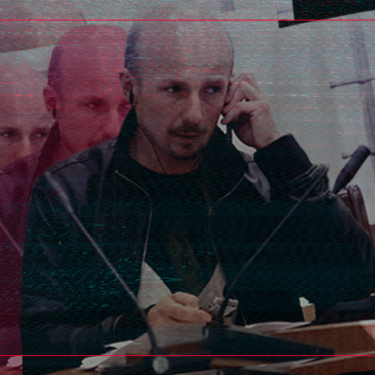
Reporters Without Borders (RSF) has obtained first-hand accounts which confirm that the Independent Ukrainian News Agency (UNIAN) correspondent was taken by Russian forces and remains detained in Russia - official denials notwithstanding. Apart from a small note in April 2022, his family has not heard from him.
Read in Ukrainian / Читати українською
Read in Russian / Читать на русском
Dmytro Khyliuk has not disappeared. Russia has built a wall of lies about the Ukrainian journalist’s fate. But five exclusive accounts obtained by RSF have allowed us to follow the reporter’s trail, from the time of his arrest on 3 March 2022, in his village north of Kyiv, to his imprisonment and harsh interrogation in a Russian prison near the Ukrainian border.
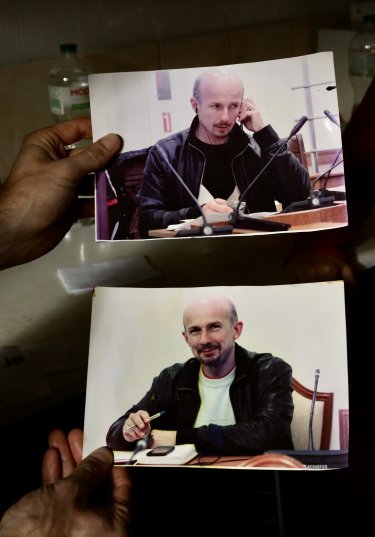
The slip of paper is barely bigger than an envelope. Khyliuk’s parents treasure it. The note bears a terse handwritten message dated 14 April 2022: “My dear mother and father, I am alive. I am in good health.” The handwriting is his. Russian troops had taken the UNIAN correspondent, along with his father, six weeks earlier, from the garden of the family house in Kozarovychi. The village, 40 km north of Kyiv, was occupied immediately after the 24 February 2022 invasion. Those few words, clearly written from a Russian prison that had not yet been identified, did not reach the family until September. Since then, no information on the Ukrainian journalist has found its way to the outside world.
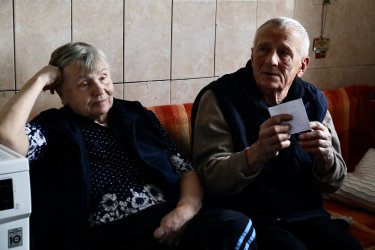
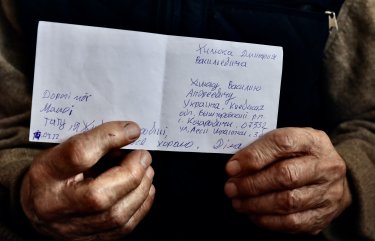
Khyliuk’s family has repeatedly requested information. Moscow has responded with lies or evasions. In a 19 January 2023 letter viewed by RSF, the Russian Federation Defence Ministry said about Ukrainian detainees: “The disclosure of specified information to other persons and organisations [apart from the International Committee of the Red Cross] is not provided by the Geneva Convention.” And, the letter added, “The Russian Federation unconditionally comply with the provisions of international humanitarian law.”
The ICRC has not had access to hundreds of Ukrainian prisoners held at Preventive Detention Centre No. 2 in Novozybkov, a small city in southwest Russia about 50 km from the Ukrainian border. RSF has traced Khyliuk to that installation. Blocked access constitutes a violation of Article 126 of the Geneva Convention on the treatment of prisoners of war. A Russian lawyer for Khyliuk ran into the same obstacle when she went to the prison last year.
“It’s as if he does not exist for them”
In another official letter of 12 January 2023 to which we have had access, the Investigative Committee of Russia, the country’s main agency in charge of enquiries involving federal institutions, insists that the “main investigation department has no information about the initiation of a criminal case against this person [Khyliuk].” Officially, then, the journalist is not detained, nor criminally charged. “It’s as if he does not exist for them,” says Tatiana Katrychenko, coordinator of the Media Initiative for Human Rights, a civil society organisation that is following the Khyliuk case.
During several weeks of investigation, RSF has gathered a series of unpublished first-hand accounts that document the reporter’s whereabouts from the time of his arrest to his imprisonment in Russia. “These accounts provide evidence of a forced disappearance and a State lie,” says Arnaud Froger, head of the RSF investigation desk.
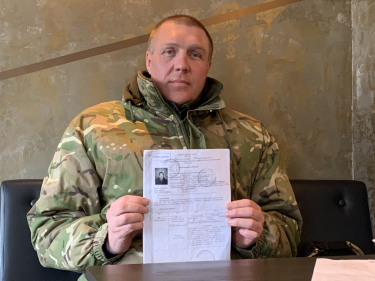
After Khyliuk and his father were arrested on 3 March 2022, the elder Khyliuk was released eight days later. But the journalist was kept in a series of makeshift prisons. One was at the Hostomel airport, which the Russians occupied at the start of the offensive. A great many prisoners passed through there. They were held in huge industrial refrigerators. A Ukrainian soldier told RSF he had been there at the same time as Khyliuk beginning on 12 March.
During the same period, Yuri, a Ukrainian intelligence officer interviewed by RSF, was also arrested and detained. On 21 march, when he was transferred to Preventive Detention Centre No. 2 in Novozybkov, Khyliuk was already there. Roll-call was held twice a day, with the names echoing down the corridor. Yuri memorised the names that Ukrainian prisoners were forced to say aloud to their guards. One name was “Khyliuk.”
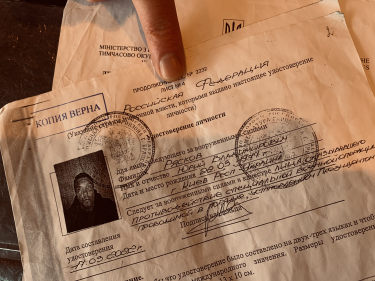
Prisoners interrogated, beaten, cut off from the outside world
A former prisoner, a soldier, gave another exclusive, first-hand account. He had been in a cell adjoining Khyliuk’s. The reporter, he said, had at first been held with at least a dozen others in a collective cell in the prison’s old building, before being transferred in April 2022 to Cell 42. He was then immediately placed in isolation, until at least late May. Members of Russian “Special Forces” interrogated him regularly about his activities, accusing him of disseminating “Ukrainian propaganda” and of “working against Russia.” Khyliuk was beaten on many occasions - a standard practice in interrogations.
Civilians and soldiers arrested in Ukraine are treated alike. Prison staff are in charge, but so are members of the special forces and the FSB, the Russian intelligence service. Conditions at the centre are not the worst in the Russian penal system, but violence, intimidation and deprivation are customary. No visits are allowed.
In a chilling account of the brutality inflicted on those arrested in Ukraine, Yuri told of being bitten by dogs set loose on him after he entered the Russian prison. After his arrest on 8 March 2020, he had to spend one night in a mass grave, using the bodies and clothing of those killed to ward off the cold.
In sum, RSF has interviewed five witnesses who confirm Khyliuk’s presence at the Detention Centre in Novozybkov in 2022. There is no question of his imprisonment in Russia. According to these accounts, at least 500 Ukrainians may still be held at that prison. The Media Initiative believes that Khyliuk is one of 123 civilians arrested in the Kyiv region and still held in Russia.
A journalist with a degree in Russian literature
But where is he now? In late February 2023, RSF gained access to a source within the Novozybkov prison. She has access to all the cells in the old building. According to her, Khyliuk has not been in that part of the prison since early January. Has he been transferred to the new building? To another prison? Is he under medical care? In February, the office of Ukraine’s attorney general assured RSF that Khyliuk was one of the people whose return Kyiv is demanding. But the office gave no specifics, and we have not been able to verify the information.
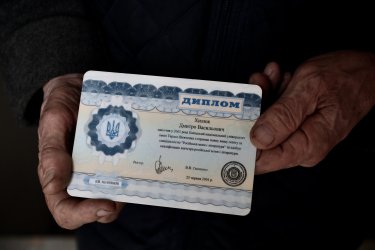
For more than a year, the journalist’s parents have had to endure daily silence and waiting. At the entrance to their house in Kozarovychi, the blue gate is still pockmarked by bullet holes. The garden is quiet. Baskerville, Khyliuk’s dog, doesn’t bark. Russian occupation troops killed him with a shot to the neck. Sitting in the living room, Halyna, the journalist’s mother, is distraught. Accusations against her son during the interrogations strike her as all the more grotesque given that she has spent her entire career teaching Russian in a Ukrainian secondary school. She shows us Khyliuk’s diploma of his master’s degree in Russian literature. Vasyl, Khyliuk’s father, takes us to the reporter’s room on the first floor of the small house. It is hardly the lair of a terrorist - the term often used against Ukrainians opposed to the “special operation.” Works by Lermontov, Dostoevsky and Nabokov share a small shelf with audio cassettes of “Civil Defence” and “Aria,” Russian rock groups that were very popular in the late 1980s. “My son has committed no crime. We miss him so much.”
